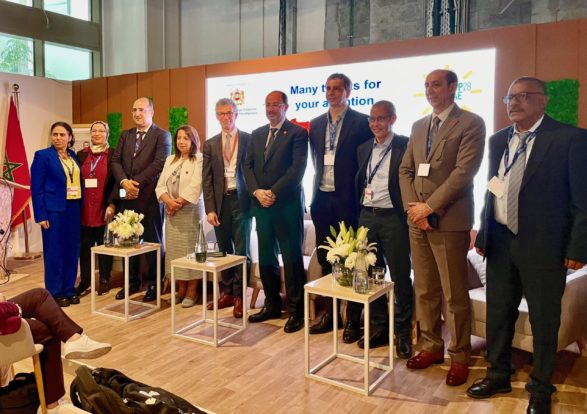

Context


Following Morocco’s membership to the 2050 Pathways Platform and further bilateral exchanges in 2019, a key challenge was identified to develop the country’s long-term low-emission development strategy. Through support from the Platform and other partners, the ambition was to bring tailored expertise and capacity to develop a step-by-step approach to long-term strategy development in the country. This step-by-step approach would help initiate a national discussion on the state of play of climate policy in the country and on the future of Morocco regarding a low-carbon development mode.

Process
The support provided by the 2050 Pathways Platform included a mix of technical expertise and financial support for capacity building. This support was provided in a two-phased approach which included:
Phase 1
The development of a long-term vision in Morocco
To kick off the LT-LEDS development process, the work was officially launched by the Secretary General of the Department for the Environment (DE) who gave the political mandate to this exercise.
The Platform appointed a team made of:
- A local coordinator with strong connections within the climate policy ecosystem in Morocco, SDG Action.
- A team of international climate policy and modelling experts – Enerdata and Solagro – to shed light on the state of play in 7 sectors from a climate change perspective.
The Platform co-animated a series of sectoral consultations with a wide range of Moroccan stakeholders. The aim of these participatory events was to gather stakeholder views on the challenges of long-term planning, develop mid-century sectoral visions, and identify options for mitigation action in the country.
Based on the consultation outcomes, a long-term vision document was drafted and circulated for further input from consulted stakeholders. Morroco’s long-term vision was officially released in 2021 following COP26 in Glasgow and submitted as the country’s first LT-LEDS.
Phase 2
The elaboration of the full LT-LEDS in Morocco
Following the success of Phase 1, the Platform renewed its support for the next phase of LT-LEDS elaboration in Morocco in partnership with the French Development Agency (AFD) and UN Environment.
As part of this, the Platform provided financial support towards:
- Local national coordination of the works, via SDG Action.
- A series of Steering Committee meetings led by the Ministry and including other governmental stakeholders.
- A series of Technical Committee meetings led by sectoral experts.
- A series of 7 sectoral decarbonization groups meeting implicating concerned stakeholders (public, private, civil society) under the lead of the relevant ministries.
The two Committees proactively worked together in partnership with the Stockholm Environment Institute (with funding from AFD) and SDG Action on the modelling of energy and land-use emissions in the country and their implications on policy. Macro-economic modelling was also undertaken.
The final outcomes envisioned are the submission of the final LT-LEDS at COP28 as well as the full transfer of the modelling capacity to a pool of Moroccan experts. A National LEAP experts platform allowing further collaborative modelisation for LT-LEDS revision as well as NDC updating are also planned.

Impact
The contribution of the 2050 Pathways Platform led to positive outcomes for LT-LEDS development in Morocco including:
- The provision of operational and sectorial guidelines on the foundational steps of LT-LEDS development based on acquired national expertise and other country experiences.
- Financial support of local capacity to drive the LT-LEDS work with the government, experts and local stakeholders.
- The co-animation of consultation events to ensure the LT-LEDS is inclusive of a diverse range of stakeholders and uses a whole-of-government and whole-of-society approach.
- Financial support of specially appointed LT-LEDS committees to develop institutional capacity to ensure continuity and accountability in the process in an optic of LT-LEDS implementation and future revisions.
Sorry, the comment form is closed at this time.